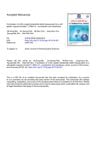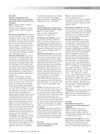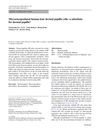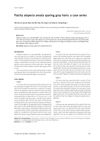 5 citations,
February 2012 in “Aesthetic Plastic Surgery”
5 citations,
February 2012 in “Aesthetic Plastic Surgery” A man developed skin cancer on his scalp after multiple artificial hair grafts.
[object Object]  4 citations,
May 2019 in “Asian Journal of Pharmaceutical Sciences”
4 citations,
May 2019 in “Asian Journal of Pharmaceutical Sciences” Created tablet similar to Avodart using γ-cyclodextrin and solubilizers.
 3 citations,
April 2016 in “Food Science and Biotechnology”
3 citations,
April 2016 in “Food Science and Biotechnology” Oriental melon leaf extract may help hair grow and keep it in the growing phase longer.
2 citations,
May 2022 in “Advanced therapeutics” A new microneedle system effectively delivers a vasodilator to hair follicles, promoting hair growth better than current treatments.
 1 citations,
January 2024 in “Nature communications”
1 citations,
January 2024 in “Nature communications” Activating TLR5 in the gut can extend lifespan and improve health in aged mice.
 1 citations,
March 2014 in “Applied Microscopy”
1 citations,
March 2014 in “Applied Microscopy” CK19 and Vimentin are proteins found in rat skin that help with skin renewal and maintaining cell structure.
 October 2024 in “Current Issues in Molecular Biology”
October 2024 in “Current Issues in Molecular Biology” Platycladus orientalis leaf extract helps hair grow by activating certain proteins.
 February 2024 in “Plant Cell Reports”
February 2024 in “Plant Cell Reports” AtVPS29 is essential for proper plant growth by regulating gibberellin signaling.
 February 2023 in “Molecules”
February 2023 in “Molecules” Cactus extract from Notocactus ottonis may help promote hair growth.
January 2023 in “Rasayan journal of chemistry/Rasayan journal of Chemistry” Methyl pyropheophorbide A from Sansevieria trifasciata leaves may help treat hair loss.
 April 2020 in “Rheumatology”
April 2020 in “Rheumatology” Rituximab therapy successfully treated a patient's complete body hair loss and was effective for six years.
 September 2011 in “Urology”
September 2011 in “Urology” The IPP index is linked to storage symptoms and leftover urine, and may help manage urinary tract symptoms.
LhGH promotes hair growth and prevents hair loss in mice.
January 2010 in “Research and Practice on Chinese Medicines” Coffee extract and caffeotannic acid can help treat hair loss.
 August 2008 in “Obstetrics & gynecology science”
August 2008 in “Obstetrics & gynecology science” Polycystic Ovary Syndrome (PCOS) is a complex disorder with both immediate and long-term health effects, including menstrual issues, infertility, and increased risk of diabetes and heart disease.
January 2020 in “Journal of Clinical Dermatology” Treating underlying metabolic and hormonal issues is key to managing female hair loss.
 January 2005 in “Korean Journal of Psychosomatic Medicine”
January 2005 in “Korean Journal of Psychosomatic Medicine” Women with alopecia often experience high levels of anxiety and depression, needing psychiatric help.
 6 citations,
December 2013 in “Journal of Dermatological Science”
6 citations,
December 2013 in “Journal of Dermatological Science” Women with alopecia may have a higher chance of getting thyroid cancer.
 1 citations,
March 2010 in “Internal medicine journal”
1 citations,
March 2010 in “Internal medicine journal” A 72-year-old man with sudden taste issues and hair growth was diagnosed with a severe stomach cancer and died within 5 months.
 75 citations,
October 2002 in “Journal of Dermatological Science”
75 citations,
October 2002 in “Journal of Dermatological Science” Sophora flavescens extract may help hair grow by affecting growth factors and blocking a hair-related enzyme.
 52 citations,
June 1981 in “International Journal of Dermatology”
52 citations,
June 1981 in “International Journal of Dermatology” Oral retinoids are effective for severe skin conditions but require careful use due to side effects.
 40 citations,
January 2013 in “Journal of Korean Medical Science”
40 citations,
January 2013 in “Journal of Korean Medical Science” Iron deficiency may contribute to hair loss.
 27 citations,
May 2017 in “Marine Drugs”
27 citations,
May 2017 in “Marine Drugs” Undariopsis peterseniana extract helps hair grow by activating certain cell growth pathways and could be a new treatment for hair loss.
[object Object]  25 citations,
November 2014 in “Ageing Research Reviews”
25 citations,
November 2014 in “Ageing Research Reviews” Skin aging is caused by stem cell damage and can potentially be delayed with treatments like antioxidants and stem cell therapy.
 25 citations,
November 2012 in “Phytotherapy Research”
25 citations,
November 2012 in “Phytotherapy Research” Crataegus pinnatifida extract may help increase hair growth and thickness in mice.
 25 citations,
April 2008 in “Archives of Dermatological Research”
25 citations,
April 2008 in “Archives of Dermatological Research” Encapsulated human hair cells can substitute for natural hair cells to grow hair.
 24 citations,
May 1982 in “Biochemical Pharmacology”
24 citations,
May 1982 in “Biochemical Pharmacology” These drugs cause hair growth without affecting testosterone or adrenal hormones.
 13 citations,
October 2017 in “Bioscience, Biotechnology, and Biochemistry”
13 citations,
October 2017 in “Bioscience, Biotechnology, and Biochemistry” Centella asiatica extract may help promote hair growth by blocking a specific cell signaling pathway.
 13 citations,
January 2014 in “Dermatology”
13 citations,
January 2014 in “Dermatology” Radiation-induced alopecia after angioembolization usually heals on its own and can look like other hair loss types, but patient history helps prevent misdiagnosis.
 13 citations,
January 2014 in “Postępy Dermatologii i Alergologii”
13 citations,
January 2014 in “Postępy Dermatologii i Alergologii” Patchy alopecia areata can affect only pigmented hairs, leaving gray hairs untouched.

























